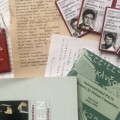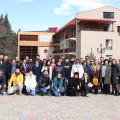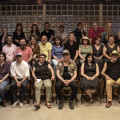What myths did the latest Artsakh War shatter for you as an intellectual?
Unfortunately, those years of relative peace had a detrimental effect of sorts on our survival instinct. We believed that it was all over, that wars had been left in the past and each of us pictured our own alternatives to the gun leaning against the wall – some of us picked up our pens, some raised their brushes, others grabbed their oboes. Despite the signals that were coming from time to time, the relative calm gave birth to the myth that the Azerbaijanis seemed to be on the path to accepting the historic facts, that someday finally the time would come when there would be no more war and there would be the long-awaited moment where we could build bridges. But, unfortunately, it turned out that the synonym for that peace was war, the synonym for coexistence was destruction, that love was actually hate. Most importantly, the only alternative for a gun was another one.
This war absolutely ruled out any other alternatives of perception.
Many years ago, in 2002, when Hrant Matevosyan was asked about what he would say to those going to the frontlines if a war broke out the next day, he replied, “I would say, ‘Victory and nothing else. Defeat is an old hag that clings to your back…’” What thoughts have come to the fore after the Second Artsakh War and our defeat that followed? How do you plan to reflect this in your writings?
For centuries, due to historical reasons, the Armenians were constantly occupied by defending their existence, which basically consisted of the fundamental need to protect whatever they had within their current borders. Since 1994, this agenda that had already been encoded in our DNA seemed to finally be overcome. For the first time since the era of Tigran the Great, the Armenians did more than just defend themselves, and it felt like the second war would simply reinforce this heritage. I say this without directing the blame at anyone – this was simply our thought process. Now, we have come full circle. Things now may be good or bad, but God forbid we end up in a situation where we no longer have borders within which we need to protect something. From this point of view, my writings will focus on—as they already do—the Armenian person that cannot find peace given the possibility that this may end up with a negative outcome. That human being whose blood vessels constrict at the thought of each drop of blood seeping out of their brother’s veins and who tries to find ways, despite everything, to replace guns with pens, brushes, and oboes.
What role can a writer’s words and text play today in reconciling the peoples, or in peacebuilding initiatives?
It hurts me to say this, but the world is not ruled by writers or any of our other colleagues from the intellectual sphere. The examples of fanatic hate for the Armenians demonstrate that societies are easily manipulated and a writer’s voice is often unheard in this deafening noise. In response to the position taken by Azerbaijani writer Akram Aylisli, who said that he wrote Stone Dreams to show that Armenians and Azerbaijanis had lived side by side for centuries, his opponents—including another writer, by the way—countered that by describing the massacres of Armenians, Aylisli was feeding the Armenian narrative, and that they should instead always write bad things about all Armenians. On the other hand, those Armenians also include Levon Javakhyan, whose wonderful story Kirva promotes tolerance and peace, even winning an award for this advocacy.
As we can see, neither Aylisli nor Javakhyan managed to make their voice heard in that overpowering noise, which was pouring out from both sides of the barricades. It pains me to say this, but I don’t believe that a writer’s words or texts can play a significant role of any kind in any reconciliation efforts. If anyone can show me an example of how a writer has ever prevented a looming war, or how they saved a single life in battle, then I promise to consider changing my position on this issue.



